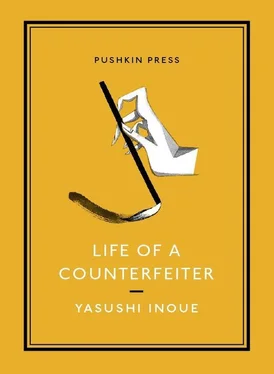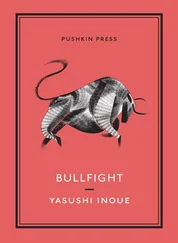Of course, this wasn’t the lake I recalled from my childhood. There were no reeds or silver grass growing on the shore, no platforms jutting out into the water where boats could be tied up.
And yet I thought the place where the man and woman had enjoyed their romance in my memory must have been very similar. The hills, the vast lake, and the brilliant sunlight were all the same.
But that lake I held in my memory was someplace I had drawn for myself, just as I pleased, over many years. I couldn’t really have remembered the shore and the reeds and silver grass that grew there, even the contours of the hills, with such perfect clarity — not at that age. If I recalled anything, it was most likely the strength of the sunlight beating down onto the lake.
It didn’t matter, though. The lake I had seen in my childhood must have been a lot like this. I had seen many lakes in my life, but never before had I stood on a shore this bright.
“It’s dazzling,” I said, repeating myself.
“You get that up in these northern provinces, I’d say,” the driver said. “There’s a special brightness to everything in spring up here, not just the lakes.”
It occurred to me that maybe the lake I recalled had been in the northern provinces somewhere — it wasn’t just the driver’s words that made me think so. And now that I’d had the thought, I began to feel I was probably right about that, even if I couldn’t identify which lake it had been.
And I had a reason for feeling this way, too. My father, who had graduated from Kanazawa Medical College before enrolling in the Army Medical School as a commissioned officer, lived in Kanazawa briefly, immediately after he graduated from Army School — maybe he was there doing research at his alma mater, I’m not sure — and so I, too, had spent part of my childhood there.
Two years or so passed after that drive along the shore of Lake Kitakata before I asked my mother if a maid or someone else might have taken me to a lake during our time in Kanazawa when I was little. She answered that she and my father were so young in those days they certainly weren’t in any position to employ a maid. If someone had taken me to a place like that, she went on, it was probably a young woman named Mitsu, a distant relation who had left home for a time to escape some kind of trouble and came to stay with my mother.
I had always called this young woman “Aunt Omitsu,” but she had died around the time I started elementary school, or maybe even earlier; she was only twenty or so. As a result, while speaking of the deceased as “Aunt Omitsu” felt perfectly natural when she came up in conversation, I had no memory of the woman herself.
About a year before she died, Aunt Omitsu had married a young official in the Forestry Bureau, which had a branch office in her village, and she left a child behind; somehow it was never entirely certain what the cause of death had been. It was an illness, of course, but after her death all kinds of rumors circulated — that she had poisoned herself, or accidentally overdosed on medicine.
“Made no end of trouble while she was alive, that girl, and stirred up more when she died.”
Several times, I had heard my mother comment on her unfortunate relative in this way. And she wasn’t the only one. To some extent, most of those who had known Mitsu had similar things to say when the conversation turned in her direction.
As a child, influenced by the thinking of the people around me, I had acquired a vague sense that the woman I knew as Aunt Omitsu was a bad person. The name made me think of a garishly colored moth, strewing white powder everywhere as it flew.
Two incidents explained Mitsu’s bad reputation among my relatives: she had withdrawn from the girls’ school she attended after some conflict about whether or not she had sent a love letter to a male student; and then, after she quit, when she was supposed to be staying at home on her best behavior, she had gotten romantically involved with Miwa, the young official in the Forestry Bureau, become pregnant with his child, and married him only after she learned that she was expecting.
Neither of these incidents was remarkable in the least — such things happen all the time — but out in the countryside people appear to have regarded her as an extremely lewd woman.
During my student days, however, I came to see Mitsu in a slightly different light. This change in perspective was brought about because I had a few occasions, talking with people when I went back to visit my hometown on the Izu peninsula, to hear stories about her.
By then, almost two decades had passed since she died, and naturally my relatives’ attitudes toward her had shifted. They started making excuses for her, commenting that she had been too beautiful for her own good, or that in the end she had just been too much of a child.
As I recall, I made the first adjustment to my childhood image of Aunt Omitsu in my first year at college, when I returned home for the Festival of the Dead. I stayed at my uncle’s house on that trip, and while I was there I heard talk about a man named Ryōhei who had left the village and now ran a successful business selling Western goods in Yokohama.
“I hear Ryōhei’s in town,” my uncle said. “How many years has it been, I wonder? Used to come down every year to say a prayer for Omitsu at her grave. Guess his passions have cooled.”
When I asked why he visited Aunt Omitsu’s grave, my aunt jumped in.
“There’s a riddle,” she said, laughing. “Must have liked her, don’t you think?”
“Not a riddle Ryōhei will ever solve, though, now she’s dead,” my uncle said.
The next day, I saw the middle-aged man they had been talking about, Ryōhei, walk past the house in a suit. He was thin with an honest air and a receding hairline; he had the composed manner, as he greeted people in the street, of a moderately successful man.
When he and Mitsu were young, there had been some discussion of their marrying — that was the extent of their relationship. There don’t seem to have been any amorous goings-on between them; it was an ordinary match, arranged by a third party. In the end, for whatever reason, the discussions fell apart, and the possibility of a match between them faded.
The rumor that Ryōhei had been in love with Mitsu made its way around the village only after she got married, gave birth to her child, and left the world behind shortly after.
Ryōhei had already moved to Yokohama by then, but each July he would go home for the Festival of the Dead and pay his respects at Mitsu’s grave. He never visited any of his relatives’ graves, aside from his own immediate family’s plot, but he made sure to go to Mitsu’s before he left. This gave rise to the rumor that he had been seriously in love with her, which gradually spread.
Year after year, Ryōhei kept coming to pray at Mitsu’s grave, as if he were making the trip down expressly to lend credence to those village rumors. Each time the Festival of the Dead rolled around, without fail, the villagers would start talking about him again. Evidently this continued for years.
I heard about one more incident back then, when I was in school. It seems a cousin of Mitsu’s, a man by the name of Togashi Kiyoji who worked in lumber, had declared in his youth that he wanted to marry Mitsu; he ran into stiff resistance from the whole family on account of the fact that he and she were cousins, and in the end he had gone after Mitsu’s older brother, who was the most vehemently opposed, chasing after him with a carving knife.
Togashi Kiyoji was a good friend of mine. Whenever I went back to my hometown, we would go out and cast nets into the river together.
Until I heard that story, I would never have believed Togashi could have such an incident in his past. He was a good man, carefree, happy-go-lucky. I couldn’t imagine him ever being seized by such violent passion, even temporarily.
Читать дальше












